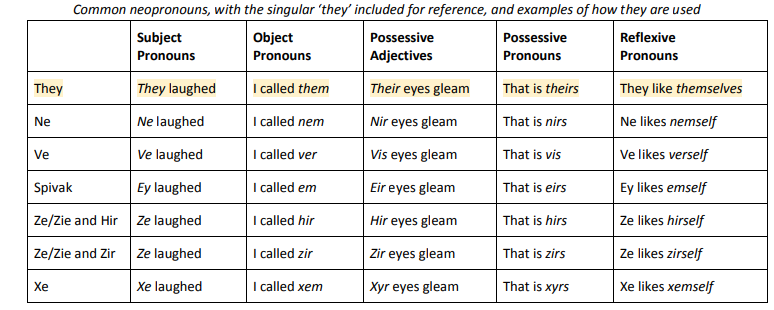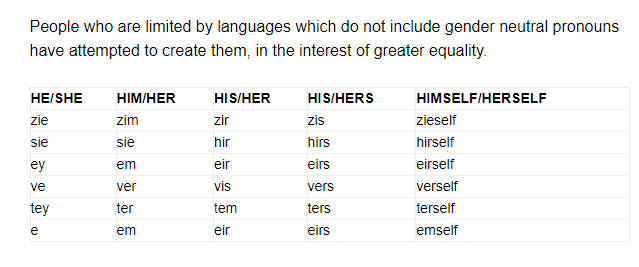(Neo-)Pronouns
What is a Pronoun?
A pronoun is a word that refers to either the people talking (I or you) or someone or something that is being talked about (like she, it, them, and this). Gender pronouns (he/she/they/ze etc.) specifically refer to people that you are talking about.
Why is it Important to respect People's Pronouns ?
You can't always know what someone's pronouns are by looking at them. Asking and correctly using someone's pronouns is one of the most basic ways to show your respect for their gender identity.
When someone is referred to with the wrong pronoun, it can make them feel disrespected, invalidated, dismissed, alienated, or dysphoric ( often all of the above.)
It is a privilege to not have to worry about which pronoun someone is going to use for you based on how they perceive your gender. If you have this privilege, yet fail to respect someone else's gender identity, it is not only disrespectful and hurtful, but also oppressive
Neo Pronouns
Neopronouns ExplainedPronouns are words that a person may use to identify themselves instead of their name. For example, she/her/hers andhe/him/his are typically feminine and masculine pronouns, respectively. However, some feel more comfortable withgender-neutral pronouns. The most common gender-neutral pronouns are they/them/theirs, used in the singular torefer to an individual in a way that isn't gendered. Some people will use more than one set of pronouns, and you areencouraged to alternate among them in conversation.Neopronouns are a category of new (neo) pronouns that are increasingly used in place of "she," "he," or "they" whenreferring to a person. Some examples include: xe/xem/xyr, ze/hir/hirs, and ey/em/eir. Neopronouns can be used byanyone, though most often they are used by transgender, non-binary, and/or gender nonconforming people.

Don't panic over pronunciation! While there are common ways to pronounce these pronouns, there are manyvariations, so it is best to ask. If someone trusts you enough to share their pronouns with you, you should feelcomfortable asking for clarification if you need it! For example, "Hey there, Taylor, I noticed the pronoun "x-e" on yournametag and I want to make sure I am pronouncing that right. Can you tell me how you pronounce it?". You also mightfind yourself in a situation where you hear a pronoun you aren't familiar with and don't know how to use. Try this:"Taylor, I heard you say you use "ze/zir" pronouns and I want to make sure I'm using them correctly. Can you help me?".
https://intercultural.uncg.edu/wp-content/uploads/Neopronouns-Explained-UNCG-Intercultural-Engagement.pdf
Gender Neutral / Gender Inclusive Pronouns
A gender neutral or gender inclusive pronoun is a pronoun which does not associate a gender with the individual who is being discussed.
Some languages, such as English, do not have a gender neutral or third gender pronoun available, and this has been criticized, since in many instances, writers, speakers, etc. use "he/his" when referring to a generic individual in the third person. Also, the dichotomy of "he and she" in English does not leave room for other gender identities, which is a source of frustration to the transgender and gender queer communities.

Here are a few you might hear:
They/them/theirs (Shea ate their food because they were hungry.) This is a pretty common gender-neutral pronoun and it can be used in the singular. In fact, "they" was voted as the Word of the Year in 2015.Ze/hir/hir (Tyler ate hir food because ze was hungry.) Ze is pronounced like "zee" can also be spelled zie or xe, and replaces she/he/they. Hir is pronounced like "here" and replaces her/hers/him/his/they/theirs.Just my name please! (Ash ate Ash's food because Ash was hungry) Some people prefer not to use pronouns at all, using their name as a pronoun instead.
https://uwm.edu/lgbtrc/support/gender-pronouns/
Bạn đang đọc truyện trên: AzTruyen.Top